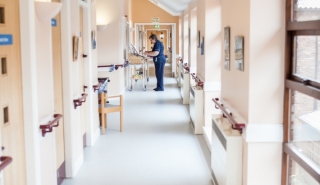Laboratory Medicine
General Information / Storage of Samples Before Analysis
Laboratory Medicine
General Information / Storage of Samples Before Analysis
All samples should be dispatched to the laboratory as soon as possible after collection to ensure best turnaround times and most accurate results. It is highly recommended blood samples should arrive in the laboratory within 24 hours of collection – the laboratory may not be able to process samples received after this time. Overnight storage of blood samples before dispatch to the laboratory is not recommended and actively discouraged.
Blood Sciences Samples: Minimising Deterioration
All samples will deteriorate from the time they are collected but, with a few simple measures, this deterioration can be minimised.
Samples collected in the hospital should be transported to the laboratory as soon as possible. For some tests special collection procedures should be followed. Please check the tables of sample requirements located in the department specific information to see if special collection procedures apply.
It is best to avoid collecting samples for urea and electrolytes, magnesium, phosphate, ESR, coagulation studies, malarial parasites, cold agglutinins and viral PCR if they cannot be transported to the hospital that day. Please arrange for the patient to attend at another time when the samples can be sent to the hospital on the transport later that day. Alternatively the patient can attend the walk in phlebotomy service at York or Scarborough Hospital or York community stadium. Opening times for these services are detailed in the Phlebotomy Service section of this handbook.
Samples collected outside the hospital should be stored at room temperature until picked up for transport to the hospital. If samples are collected after the transport has left then they should be placed in a refrigerator except those samples for genetic tests (EDTA), HLA B27 (EDTA), joint aspirates or other “sterile fluids”, urethral swabs and HVS.
Some surgeries have centrifuges to spin down brown top blood samples. Once spun down, these samples are relatively stable but may be stored in a refrigerator until collected by transport. Please clearly mark the request card that the sample has been centrifuged. Please follow the guidance in the Information sheet for centrifugation when preparing the sample for storage.
Microbiology Samples: Minimising Deterioration
All fluids, e.g. CSF, pleural fluid, joint fluids and pus require culturing without delay. Specimens should preferably be taken during laboratory opening hours and sent immediately to the Department. The Microbiology Department (NOT general pathology reception) should be warned of the arrival of urgent and important, unrepeatable specimens. If taken outside laboratory hours the Microbiology “BMS on-call” should be contacted via Switchboard.
In general all specimens should reach the laboratory as soon as possible after being taken. Micro-organisms may be susceptible to drying, heat or cold (particularly freezing). In specimens such as sputum and urine they can multiply to inappropriate levels.
Genital pathogens and anaerobic organisms are particularly sensitive to delays before culturing
All bacterial swabs should be placed in transport medium (the jelly seen in many swab tubes) which prevents drying, maintains pH and excludes oxygen; Swabs should be kept at room temperature until delivery to the laboratory.
Urine for culture should always be taken in the borate containing red-topped 30ml bottles to prevent bacterial overgrowth. Refrigerate until delivery.
Specimens of clotted blood (brown top “serum” tubes) are suitable for all serological tests. Refrigerate until delivery: do NOT freeze.
Blood cultures - Keep at room temperature and send the broths to the laboratory. Do not place on radiators etc as they get too hot (many pathogens cannot tolerate temperatures over 37°C).
Please contact the laboratory for further information if required.
Diagnostic Cytology & Andrology Samples: Minimising Deterioration
The department opening times are Monday to Friday 8.30 – 17.00. In general all specimens should reach the laboratory as soon as possible after being taken. For information on cytology specimens: Click Here
Unfixed samples: serous fluids, peritoneal washings, cerebrospinal fluids, cyst aspirates, synovial fluids and urine samples should be transported to the laboratory as soon as possible. However, if there will be a delay i.e. if they are taken at the weekend, or out of hours, they must be refrigerated. Please inform portering staff that the sample must be placed in the box labelled for cytology samples in the walk-in fridge on first floor of Laboratory Medicine at York.
Samples from endoscopy clinic (e.g. gastric, biliary, oesophageal and bronchial brushings, bronchial washings/ lavages and endobronchial ultrasound bronchoscopy (EBUS)) should be sent in CytoRich red fluid. This is a fixative which preserves cells and therefore should be kept at room temperature. Fixed samples do not need to go in the fridge, but refrigeration will not cause any deterioration.
Fine needle aspirate samples should have the needle washed in CytoRich red fluid. If required direct smears can be prepared onto labelled glass slides and these should be rapidly air-dried before placing in the plastic slide box to be sent to the lab. Both the slides and needle washings can be kept at room temperature, but refrigeration will not cause any deterioration.
For information on the collection of seminal fluid samples for fertility analysis: Click Here
For information on the collection of seminal fluid for post vasectomy analysis: Click Here
For cytology samples that require testing at HMDS please contact the laboratory in order to determine transportation times. Samples that only require testing at HMDS please send these direct according to advice from their website.
Further details for HMDS samples can also be seen here
Web Page 22 Last Reviewed: 15/06/2022
Advice for Requesters - Cervical Cytology
Laboratory Information Management System
How to Send Samples to the Lab
Advice for Requestors - Immunology
Advice for Requesters- Microbiology
Guidance on test interpretation- Clinical Biochemistry
Transportation of Samples and Postage
High Risk/Danger of Infection Samples
Request form and specimen labelling






